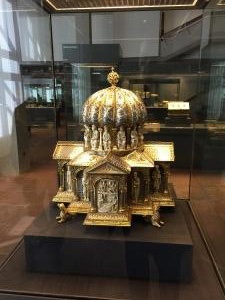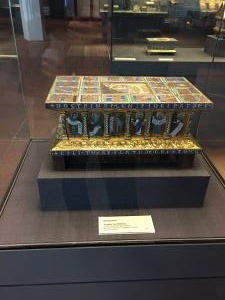Paintings by Beckmann, Gris and Klee Valued at Nearly $20 Million That Once Belonged to Flechtheim Are at Issue in New York Lawsuit
Sullivan & Worcester LLP has filed suit against Bavaria and its state museums in U.S. District Court in Manhattan on behalf of our clients Dr. Michael Hulton and Mrs. Penny Hulton, heirs to the renowned and persecuted Jewish art dealer Alfred Flechtheim. The Hultons have asked the United States District Court for the Southern District of New York to restitute several paintings by Max Beckmann, Paul Klee, and Juan Gris that are now in the possession of the German federal state of Bavaria, Adolf Hitler’s and the Nazi party’s homeland, and its Bavarian State Paintings Collections (known in German as the Bayerische Staatsgemäldesammlungen, or BSGS). We are aided in this case by our co-counsel Markus Stoetzel and Mel Urbach, Esq.
Read More
Topics:
Frankfurter Allgemeine Zeitung,
Cornelius Gurlitt,
Deutschlandradio. Deutsche Presse Agentur,
Monuments Men,
Nazi-looted art,
Foreign Sovereign Immunities Act,
Max Beckmann,
Markus Stoetzel,
Mel Urbach,
Paul Klee,
FSIA,
Gurlitt,
NS Raubkunst,
Restitution,
Bavaria,
Sullivan & Worcester LLP,
World War II,
Alfred Flechteim,
Bayerische Staatsgemäldesammlungen,
Dr. Michael Hulton,
Juan Gris,
George Grosz
The Holocaust Expropriated Art Recovery (HEAR) Act of 2016 has been pending for several monthsnow, and was recently recommended favorably by the Senate Judiciary Committee in September. The bill would create a uniform six-year statute of limitations for Nazi-looted art claims, harmonizing an otherwise patchwork state by state system. While that consistency was laudable, our concern was that the bill as proposed would overrule New York’s important demand and refusal approach to statutes of limitations, with the effect that many otherwise timely claims in New York might become barred. The bill’s text has been quietly amended to correct that, and in other interesting ways as well. With the Presidential election just two weeks away, however, it remains anyone’s guess if the bill will become law before the new Congress is seated in January.
Read More
Topics:
Legislation,
Nazi-looted art,
Restitution,
Statute of Limitations,
World War II,
HEAR Act,
demand and refusal

Word came this week of two resolutions of claims to Nazi-looted art in museums in New York and Cologne, and a new Nazi-looted claim against Germany filed in Washington. Barely a month after the Neue Galerie (of Austrian and German art) in New York announced that it had discovered a “major work” in its collection had a clouded history, the museum announced an agreement concerning the Karl Schmitt-Rotloff painting Nude (1914). It is not known if the Schmitt-Rotloff is the same work to which the museum referred last month. Around the same time, the Wallraff-Richartz-Museum in Cologne, Germany, announced that it had agreed to return a drawing by Adolf Menzel that had been sold to Hildebrand Gurlitt as its owners fled Nazi Germany in the 1930s. Blick über die Dächer von Schandau (View over the rooves of Schandau) (1886) will be retuned to the heirs of Hamburg attorney Albert Martin Wolffson and his daughter Elsa Helene Cohen. These settlements are examples of constructive dialogue and enlightened treatment of the historical fact. The new litigation likely means the opposite approach from the German defendants.
Read More
Topics:
Cologne,
Schwabinger Kunstfund,
Breslau,
Gurlitt Task Force,
Germany,
Wallraf-Richartz Museum,
Nazi-looted art,
28 U.S.C. 1605(a)(3),
Gurlitt,
David Toren,
Neue Galerie,
Ernst Ludwig Kirchner,
New York,
Karl Schmitt-Rotloff,
Alfred and Tekla Hess,
Streen Scene in Berlin,
Adolf Menzel,
Strassenzene

Two restitution related bills have advanced past the Judiciary Committee of the United States Senate: the Holocaust Expropriated Art Act (S.B. 2763, the HEAR Act), and the Foreign Cultural Exchange Jurisdictional Clarification Act, S.B. 3155. Their advancement for consideration by the full Senate is interesting since in many ways they are at cross purposes with each other. The analytical coverage of each has also been somewhat frustrating insofar as much of the reasons expounded by their proponents do not really describe what the bills would do. The HEAR Act would not restitute any Nazi looted art, rather, it would harmonize as federal law the statute of limitations on such claims. The Foreign Cultural Exchange Jurisdictional Clarification Act would not “reward” Russia or other foreign museums with art claimed by others, it would eliminate a jurisdictional scenario that has only happened once. The fact is that both bills are of dubious merit because they are of limited effect, and may cause more harm than good.
Read More
Topics:
Legislation,
Nazi-looted art,
FSIA,
Restitution,
World War II,
IFSA,
HEAR Act,
Ted Cruz,
S.B. 2763,
S.B. 3155,
Foreign Cultural Exchange,
Jurisdictional Clarification Act
Just as it appeared that the first trial in years would begin next month on a claim of Nazi-looted art, the much publicized Von Saher case has come to an end with a judgment that entered yesterday. The U.S. District Court awarded the Norton Simon Museum summary judgment on the claims to ownership of Adam and Eve by Lucas Cranach the Elder, ending pending further appeal a nearly decade-old litigation. Over the years, the Von Saher case has made new law about statutes of limitations, constitutional law, and the scope of U.S. foreign policy as it impacts the courts. Like the Cassirer case last year, it is a bitter blow for the claimants who labored for years to recover the paintings and for whom it appeared their day in court had arrived. This is all the more so because there was no dispute in the briefing that the paintings had been expropriated by Hermann Göring’s rapacious henchman.
Read More
Topics:
Norton Simon Museum,
Alois Miedl,
Jacques Goudstikker,
Nazi-looted art,
Hermann Goering,
NS Raubkunst,
Restitution,
Marei Von Saher,
World War II
Supposed Changes to German Advisory Commission on Nazi Looted Art Short on Specifics
There have been a number of articles this week indicating that Germany intends to reform the “Advisory Commission on the return of cultural property seized as a result of Nazi persecution, especially Jewish property” (Beratende Kommission im Zusammenhang mit der Rückgabe NS-verfolgungsbedingt entzogener Kulturgüter, insbesondere aus jüdischem Besitz) that is charged with making recommendations to German museums on claims for art allegedly looted or bought under duress during the Nazi era. Yet the most astonishing part of the news is that it is no news at all. It is merely a repetition—if that—of what was promised in March. Only now it is not even a promise, it is an indication that proposals may be forthcoming at some indefinite point in the future. It is further evidence that the entire endeavor does not deserve to be taken seriously. At best, the “reforms” would address some of the appalling discriminatory comments made earlier this year. But nothing proposed so far would compel a museum to submit to the commission, about which Bavaria in particular—the federal state that isin the midst of its own scandal for returning art to actual Nazis while giving heirs the runaround—notoriously refuses even to appear before the commission
Read More
Topics:
Alfred Flechtheim,
Germany,
Nazi-looted art,
Advisory Commission,
Gurlitt,
NS Raubkunst,
Restitution,
Bavaria,
World War II,
Limbach Commission
The revelation that Bavaria re-sold looted artworks to Nazi families while giving victims and their heirs the run-around for years has clearly touched a nerve at the Bavarian State Paintings Collection (the Bayerische Staatsgemäldesammlungen, or BSGS). Days after the Sueddeutsche Zeitung exposed that the Commission for Looted Art in Europe (CLAE) had given the lie to years of deception by the BSGS, the BSGS issued a long, rambling, and defensive statement in defense of its actions. The statement is a classic case of misdirection. Reaction to the story and the BSGS response can be found at the Observerand the Telegraph.
Read More
Topics:
Bayern,
Nazi-looted art,
Commission for Looted Art in Europe,
Restitution,
Bavaria,
World War II,
Raubkunst,
Bayerische Staatsgemäldesammlungen
Works returned by Monuments Men to Bavaria for restitution to victims instead sold to Nazis’ families
Journalists Catrin Lorch Jörg Häntzschel published this weekend an explosive revelation in Sueddeutsche Zeitung entitled “the Munich Looted Art Bazaar,” reporting on the work of the Commission for Looted Art in Europe (CLAE): the government of Bavaria sold artworks returned to it after World War II by the famed Monuments Men that were supposed to be restituted to the victims of Nazi looting. Not only was the art given back to the German state on the explicit condition that it be restituted to the victims of Nazi art plunder, in some cases it was literally returned to the families of Nazi officials, such as Emmy Goering (Hermann’s daughter) and Henriette von Schirach rather than to the victims themselves. Less than a month after the Federal Republic of Germany’s toxic and revisionist reply brief in the Welfenschatz case (which argued, among other things, that individual claimants cannot sue because the U.S. policy was this national level restitution), the ramifications are far reaching for Germany’s self-professed adherence to the Washington Conference Principles on Nazi Looted Art of 1998. While the specific artwork in question may be less significant than most of the works found in Cornelius Gurlitt’s apartment four years ago, the revelation is in many ways much, much worse. The CLAE scholarship that lead to this schocking development cannot be praised enough.
Read More
Topics:
Monuments Men,
Nazi-looted art,
Munich,
Gurlitt,
NS Raubkunst,
Restitution,
World War II
The Senate Judiciary Committee held a hearing this week (video available here) on the Holocaust Art Recovery Act (the “HEAR Act”) that drew welcome attention to the ongoing challenges to the restitution of Nazi-looted art. We were skeptical about the bill’s chances for passage when it was proposed for largely structural reasons: it is the summer before a Presidential election, which is a time when things rarely get done in Washington. Yet it is undeniable that with its bipartisan sponsors Richard Blumenthal, Charles Schumer, Ted Cruz, and John Cornyn—strange political bedfellows under any circumstance—the hearing was an open and constructive discussion that showcased real momentum towards passage. Senator Chuck Grassley’s expediting of the hearing is also a sign that there may be a vote soon. This is important, because recent bills to amend the FSIA as to looted art claims, for example, have never even had a hearing in the Judiciary Committee, let alone gotten a vote (they did pass the House first). Yesterday’s hearing definitely moves the bill into a different category with regard to its prospects. The President has not made any comments on it—yet.
Read More
Topics:
Legislation,
Nazi-looted art,
Restitution,
Statute of Limitations,
Charles Schumer,
John Cornyn,
Richard Blumenthal,
Ted Cruz
We filed yesterday the opposition to the motion to dismiss my clients’ claims over the 1935 forced sale of the Guelph Treasure, or Welfenschatz. The motion was filed two months ago by defendants Germany and the Stiftung Preussischer Kulturbesitz. As we noted when Germany first moved to dismiss the complaint last fall, Germany’s arguments were revisionist and alarming in a number of troubling ways, most seriously because they tried to excuse persecution of Jews before an arbitrary date as an internal affair not subject to U.S. court jurisdiction, and because it repudiated Germany’s international commitments under the Washington Principles to address restitution claims on the merits. The abject failure of the Advisory Commission, which Germany tries to portray here as some sort of arbitration (which it is not) is also at the fore.


Read More
Topics:
Nazi-looted art,
Foreign Sovereign Immunities Act,
Advisory Commission,
Beratende Kommission,
FSIA,
NS Raubkunst,
Restitution,
World War II,
Welfenschatz,
Limbach Commission





